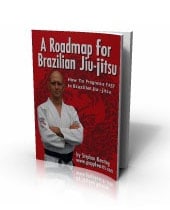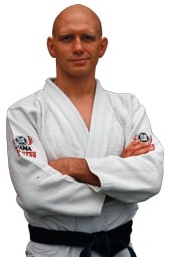
I often get asked about the best kind of conditioning for BJJ and MMA.
People want to know what’s better: running vs swimming, circuit training vs powerlifting, crossfit vs bodybuilding, sprints vs extended cardio, kettlebells vs dumbbells, bodyweight exercises vs barbells..
Having done quite a bit of strength and conditioning over the last 20 years I actually do have some definite opinions about these topics. But the thing is that my opinions apply only to me.
You have to figure out what works for you by trial and error. There are no cookie-cutter solutions in this area, only good starting points for your own experimentation!
You may read books, listen to the experts, or try out someone else’s program, but those are only things to try out. Ultimately it’s your responsibility to figure out what kind of workout works best for you, and the only way you can find that out is by trying it yourself and then seeing how it affects you.
Here’s a good example from my own training…
Most conditioning experts say that BJJ and MMA athletes should be doing mostly sprint work, and not long cardio sessions (aka L.S.D training).
They point out that 5 minute rounds (or 10 minute matches) aren’t one steady-state effort. Instead they consist of a series of intense struggle and scrambles, interspersed with relatively easier periods during which you’re not working quite as hard.
And so, the argument goes, a 40 minute aerobic jog in the forest is a complete waste of time. You should do shorter, more intense sprint intervals, developing your anaerobic pathways and more closely simulating what actually goes on in a match.
This is good theory, and it does work for a lot of people.
But it’s not true for me, and I’ve tested it multiple times!
For the last 20 years I’ve gone through periods where I was doing a ton of sprint work. I’ve used different models and workouts, ranging from hill sprints, to Tabata intervals, to killer firefighter combat challenge treadmill workouts.
And while doing this training I tried to keep an eye on my jiu-jitsu, including how I felt on the mats and how I measured up against various training partners.
Now it is true that the sprint work certainly helped. Without a doubt my jiu-jitsu during those sprint-intensive sessions felt better than if I had been doing nothing at all.
But was it optimal? No, not at all.
Through repeated experimentation I discovered that my own jiu-jitsu felt sharpest when I focused on longer, steady-state cardio. These sessions typically consisted of 30 to 60 minute runs, and/or 45 to 55 minute torture sessions where I climbed a local mountain and then took the gondola back down.
Longer, steady-state cardio really translated to improved performance on the mat for me.
I’m not really sure why this is is the case. Maybe it’s something about fast-twitch vs. slow twitch muscles, maybe it’s something biochemical, or maybe it’s reflective of the types of techniques I like (I don’t gravitate towards techniques that require tons of explosive athleticism).
But ultimately the reasons are irrelevant. The take home lesson is that there’s something about being able to sustain a high heart rate and oxygen consumption for 30 to 60 minutes that just works for me.
Does this mean that you should be doing steady-state cardio just like me?
Hell No!!!
It means that you should treat yourself like a lab rat. Try out different protocols and see how you feel.
Try sprints. Try long slow distance. Try swimming. Try circuit training. Try barbell squats. Try Turkish getups with gel-filled vibrating kettlebells. And try not doing any conditioning at all and just getting as much mat time as possible.
So long as you don’t permanently injure yourself then it’s all good information.
Eventually you’ll find something that you enjoy and that works for you. And it’ll probably be different than what works for me, and different from what some world-renowned fitness expert is telling you to do.
Plus you’ll have some funny stories about the crazy protocols you tried along the way.
Everyone has a different physiology, psychology, and style of game. It’s insane to think that there’s a one-size-fits-all solution. Have fun, experiment, and keep an open mind, you special unique snowflake you!
“Listen to everyone, follow no one” – Dean Karnazes, Ultramarathoner, ran 50 consecutive marathons in 50 days in 50 states.


